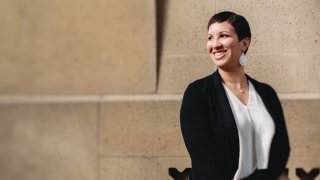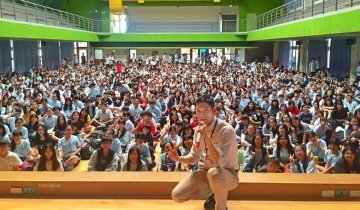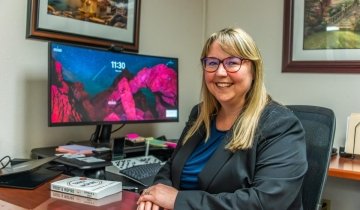When Micki Smith BA ’15, MS ’17 was in high school and thinking about college, her counselor suggested she apply to USC. Smith hadn’t considered USC because she thought, as a private school, it would be out of reach for her financially. But she dutifully sent in her application, and when she was accepted, she decided to go on a campus visit before making her decision.
“I was blown away by how gorgeous the campus was,” Smith recalls. And lucky for Smith, “who grew up in band,” she had an opportunity to see the USC Trojan Marching Band perform. She remembers leaning over to her mom and whispering, “I think I’m going to join the band.”
Smith marched with the Spirit of Troy for four years while she was an undergraduate at USC. And through a combination of scholarships and work-study positions, the psychology major was able to make the numbers work.
Attending graduate school was always “part of the plan,” Smith says, and psychology opened up a variety of paths. As she began to think about what type of master’s degree she wanted to pursue, with the help of her advisor, she landed on either social work or marriage and family therapy. “After doing my own research, MFT programs resonated more with me and the work I wanted to do,” Smith says. Working with individuals, families and couples appealed to her, and when she told family and close friends of her decision, they thought it was a vocation well suited to her. Smith loved her undergraduate experience at USC, so selecting USC Rossier’s Master of Science in Marriage and Family Therapy program was an easy choice.
While Smith gained invaluable skills via the MFT program and particularly lauds the program for its focus on social justice issues, she also made lifelong friendships. Members of her cohort are “very tight knit,” Smith says. They congratulate one another on professional and life achievements, from new jobs and promotions, to weddings and births. The program, Smith explains, is “not just academic; it’s also self-reflective. It’s really innovative, the way that they have it set up, because it allows you to view the therapeutic experience from both sides—as a client and as the future therapist.”
Smith has stayed in touch with Professor of Clinical Education Mary Andres. She looks up to her, considers her a mentor and often turns to her for job references. Since the double Trojan is now an accomplished therapist in her own right, she’s enjoyed seeing her relationship with Andres evolve from student-professor to colleague. Smith, Andres says is “an ideal combination for a successful USC MFT student because she was intellectually curious, aligned with the mission of serving communities with high needs, and courageous about moving out of her comfort zone and into a leadership position.”
Since completing the program, Smith has worked at the Institute for the Redesign of Learning in various roles. IRL provides mental health services for low-income children and young adults in Los Angeles County and the surrounding area. She started as a field-based mental health therapist. In this role she provided mental health services to clients from a variety of referral sources—specialized foster care, schools and the Los Angeles County Department of Children and Family Services. She met with her clients where they were at—literally. She would come to whatever location was easiest for them to get to, whether it be their home, school or Starbucks. “This is community mental health,” Smith says, “it’s essentially bringing [services] to them in the most convenient, accommodating way so that they don’t slip through cracks.”
During her time in the field, Smith says she “learned so many different interventions and ways to [help] individuals, [from] playing with a two-year-old to talking to a 20-year-old with any range of diagnoses—depression, anxiety and a lot of trauma.” In her next role, she continued to meet with a handful of clients and started conducting in-depth, court-mandated assessments of children who had been removed from the care of their biological parents due to allegations of abuse. Now, as a program manager she oversees a team of case managers and clinicians.
The work can be heavy, but Smith has a strong self-care system in place. She starts her day by going to the gym, reads fiction, loves to color and leans on her loved ones when she has a particularly challenging day. After nearly six-and-a-half years of working in community mental health, Smith has also learned “how to leave work at work,” and she’s never opposed to seeking her own therapy when she feels she needs it.
When Smith thinks about where she wants to be in the future, she thinks of being a change maker and debt free. She’s only four years away from reaching student loan forgiveness under the Department of Education’s Public Service Loan Forgiveness plan due to her work at a qualified non-profit organization. As for being a change maker, Smith would love to run her own non-profit eventually and continue to work with “marginalized communities that wouldn’t normally seek out mental health [services.]”
This type of work, Smith says, was emphasized at USC Rossier. Smith found that her professors and her cohort were passionate about the intersections of mental health and social justice and working with hard-to-reach populations, whether it be LGBTQ+ individuals, minoritized populations or incarcerated individuals. If “that’s the work you want to do,” Smith says, “USC is the place to be.”





